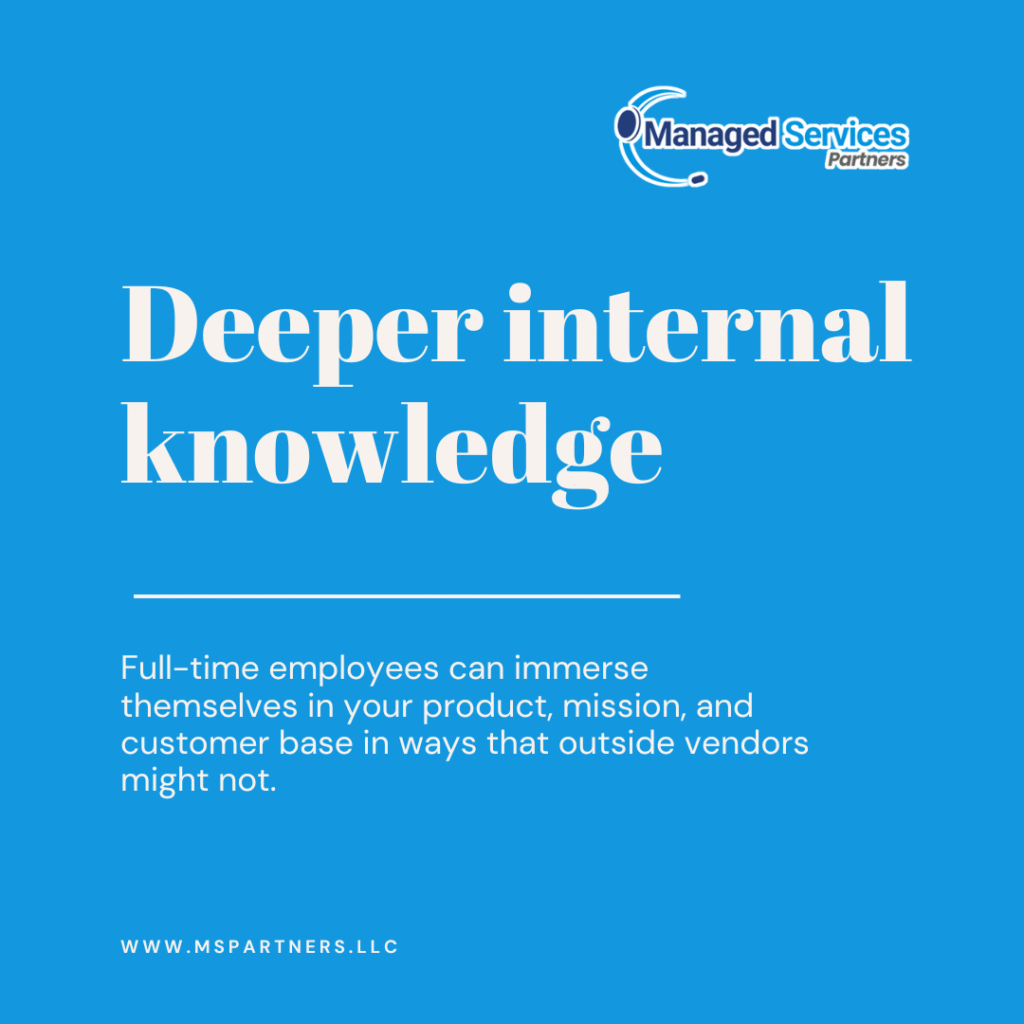
When you’re growing a business, few decisions feel as high-stakes—or as confusing—as figuring out whether to build your team in-house or bring in external help.
Maybe you’re a startup founder wearing too many hats. Maybe you’re an SME leader watching costs rise and wondering if you’ve outgrown your current setup. Or maybe you’re just stuck in analysis mode, staring at spreadsheets and headcount forecasts trying to predict what’s sustainable six months from now.
We get it. The choice between hiring and outsourcing isn’t always straightforward, and the right answer often depends on your specific growth stage, goals, and resources.
Let’s break it down—honestly, without the fluff—and help you figure out what makes the most sense for where your business is right now.
The Case for Hiring In-House
There’s something appealing about building a team that’s 100% yours. It offers a level of cultural control and continuity that many leaders value deeply, especially in the early days.
Pros of Hiring In-House:
Deeper internal knowledge: Full-time employees can immerse themselves in your product, mission, and customer base in ways that outside vendors might not.
Tighter culture fit: Building a strong internal culture is easier when your team is directly employed and bought into your long-term vision.
Long-term investment: In-house staff can grow with your company, building institutional knowledge and leadership over time.
That said, hiring in-house comes with its share of tradeoffs—especially if you’re in a growth stage where things change quickly.
The Considerations:
Time-consuming recruitment: Hiring takes time. Writing job descriptions, interviewing, onboarding—it’s a resource-intensive process.
Higher fixed costs: Salaries, benefits, tools, training—it all adds up. And if the role isn’t fully optimized or scalable, it can be a financial strain.
Flexibility challenges: What if demand drops? What if your priorities shift in three months? Hiring is a commitment, and in a fast-moving business, that can become a liability.
The Case for Outsourcing
Outsourcing has come a long way in recent years. It’s no longer just about cutting costs—it’s about gaining agility, accessing specialized talent, and scaling smarter.
Pros of Outsourcing:
Speed and flexibility: Need to launch a new customer service channel or get support with compliance? An outsourcing partner can usually spin things up faster than you could internally.
Access to experts: You don’t have to be an expert in IT, payroll, or cybersecurity. Your BPO or managed services partner already is.
Scalable costs: Most outsourcing models are variable, so you only pay for what you use—helpful when growth is unpredictable.
Lower overhead: No recruiting, no onboarding, no managing payroll or benefits. That’s time and cost back to reinvest in your core business.
That said, hiring in-house comes with its share of tradeoffs—especially if you’re in a growth stage where things change quickly.
The Considerations:
Less control (if you’re not careful): Poorly defined scopes or mismatched partners can lead to miscommunication or inconsistent output.
Onboarding still matters: Even outsourced teams need context. If you don’t set them up with the right processes or knowledge, results will suffer.
Perceived distance from the business: You may need to invest effort to keep outsourced teams aligned with your brand voice, customer expectations, and internal culture.
So… Which One Is Right for You?
The truth is, there’s no one-size-fits-all answer. But there are some questions you can ask yourself to figure out what direction makes sense for your stage of growth:
1. What’s your most immediate bottleneck?
Are you overwhelmed by administrative tasks like IT maintenance or HR paperwork? Outsourcing those functions can free you up quickly. On the other hand, if you’re looking to build out a core product or service, hiring in-house might be worth the investment.
2. How stable are your needs right now?
If you’re still testing markets or pivoting quickly, outsourcing gives you more flexibility. But if you’ve hit a stable rhythm and are building for the long haul, it might be time to solidify key roles in-house.
Request a Quote
Experience the benefits
of outsourcing
3. What’s your cash flow situation?
Hiring in-house often means higher upfront costs and longer ROI timelines. Outsourcing can be more budget-friendly in the short term—and often makes sense when you need to “do more with less” in the early or transitional phases of growth.
4. Are you looking for speed or sustainability?
Need to get something up and running yesterday? Outsourcing is likely the faster route. Looking to build institutional knowledge and grow leaders internally? Then consider bringing that function in-house.
A Hybrid Model: The Best of Both Worlds
Here’s the good news: you don’t have to pick a lane and stay there forever.
Many growing businesses use a hybrid approach—outsourcing non-core functions like IT, finance, or customer support while building their core team in-house. This allows them to stay lean, agile, and focused, while still getting access to the infrastructure and expertise they need.
It’s a smart way to scale without burning out your team or your budget.
Request a Quote
Find the right people
How Managed Services Partners LLC Fits In
If you’re leaning toward the outsourcing route—or just curious to see what it could look like—Managed Services Partners LLC is built to support businesses exactly like yours.
We specialize in helping startups and SMEs outsource key operations with confidence. Whether it’s IT support, cloud services, back-office processes, or customer care, we work closely with you to understand your goals and build a solution that supports them—without overcomplicating things.
Our approach is collaborative, transparent, and always rooted in long-term partnership. We’re not here to “take over”—we’re here to help you grow smarter, faster, and with fewer headaches.
Final Thoughts
At the end of the day, the decision to outsource or hire in-house is about alignment—between your business model, your stage of growth, and your strategic priorities.
Whichever route you choose, the key is to be intentional. Don’t hire because it feels like the default. Don’t outsource just because someone told you it’s cheaper. Take the time to understand what your business needs right now, and build a model that supports that—while leaving room to evolve.
And if you’re somewhere in the middle, exploring options, or just looking for a sounding board—Managed Services Partners LLC is always happy to have a no-pressure conversation.








